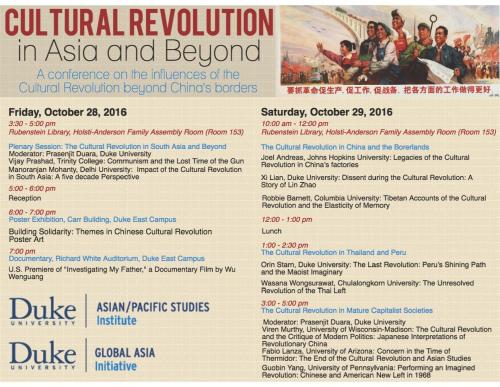
Cultural Revolution in Asia and Beyond

On October 28th and 29th, Duke University held a two-day conference titled Cultural Revolution in Asia and Beyond at the Rubenstein Library Holsti-Anderson Family Assembly Room. The conference, co-sponsored by Duke’s Global Asia Initiative and the Asian Pacific Studies Institute, brought together a number of distinguished professors to discuss the influence of the Cultural Revolution on countries beyond China’s borders.
2016 marked the 50th anniversary of the start of the Cultural Revolution in China. While the Chinese state media made no official mention of the anniversary, students and scholars who attended the conference at Duke participated in lively debates and discussions on the lasting impact of the Cultural Revolution.
On October 28th, Prasenjit Duara, Director of the Global Asia Initiative convened a panel that included Manoranjan Mohanty of Delhi University, who talked about the long history of the influence of the Cultural Revolution in South Asia, and Vijay Prashad of Trinity College, who presented his research on communism and the lost time of the gun.
After the opening panel, conference participants and attendees visited the Franklin Gallery in Carr Building, where Duke professor Sucheta Mazumdar curated the exhibit “Building Solidarity: Themes in the Chinese Cultural Revolution.” Participants then attended the U.S. premiere of Investigating My Father, a documentary film by Wu Wenguang of the Memory Project.
On October 29th, scholars presented their research on the influence of the Cultural Revolution in China and the Borderlands, Thailand, Peru, and mature capitalist societies. Prominent Duke scholars who participated in the panels included Ralph Litzinger, Xi Lian, Eddy Malesky, Orin Starn, and Kang Liu.
A highlight of the conference was when Duke professor Xi Lian presented his current research project on Lin Zhao (1932-1968), a political activist and Christian figure who supported the Cultural Revolution and then later became one of its most staunch critics. As Professor Lian read Lin Zhao’s writing from her blood letters (letters Lin Zhao wrote in her own blood while imprisoned), conference attendees were captivated by the courage and conviction of Lin Zhao’s voice, which still had to the power to evoke vivid memories of the Cultural Revolution several decades after it ended.